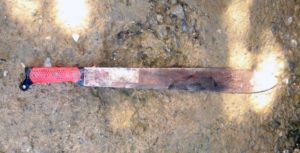My plucky wife slipped the medical release document between unmarked leaves of her passport. Stamped Canandaigua, N.Y.,, her doctor’s letter had okayed this, her first-ever overseas flight. We would board for Africa May 26 – our first child (we didn’t know the gender) to be born in under two months.
***
“Where have you been?” The director’s voice carried an edge, the tone anything but casual.
A day earlier Ann and I had travelled the 5 ½ hours from upstate New York to Brooklyn. We would lodge at an inner-city Mission before passing through one of JFK Airport’s many international gates to then ascend into friendly blue skies.
The Mission sat in a more sullied neighborhood where pedestrian traffic sadly displayed prominent signs of addiction and vice. We probably should have known better than take our stroll around the block.
“We took a stroll around the block. . . maybe a couple blocks.”
“Please,” the Mission director’s eyes were pleading. “Never do that in these neighborhoods – day or night – not without at least one of our staff along.”
We nodded meek compliance.
Next day a gregarious volunteer-driver with a heavy gas-pedal-foot chimed, “Hey guys, on our way to the airport, let’s go via Coney Island.” I loaded luggage into the old van and helped Ann settle on to a bench seat partway back.
Street conditions citywide have trended downward somewhat since 2012, according to the Mayor’s Management Report.
So reads data filed by New York City’s Independent Budget Office. But based on a 1972 Coney Island van ride with an expectant missionary wife on board, the recent trending downward had not been the first. Of things hoped for in the nation’s biggest city, traversing Coney Island pot holes at head-clunking speed was not counted among them.
Nine years after Idlewild was renamed John Fitzgerald Kennedy International Airport we shuffled our way into the cavernous belly of America’s most-renowned passenger aircraft of the times. A behemoth of an aircraft, the Boeing 747, commonly tagged Jumbo Jet.
Our seat-belts fastened, we took each other’s hand and I voiced a prayer. The moment felt surreal. Here we were, really off to the great Africa continent. To serve – hopefully for years to come.
The leg to England was relaxed, given our adrenaline-charged hours leading to it. We would need relaxing, considering what lay ahead.
Changing airplanes in London we expected. Changing airports we did not.
©2017 Jerry Lout




 ***
***